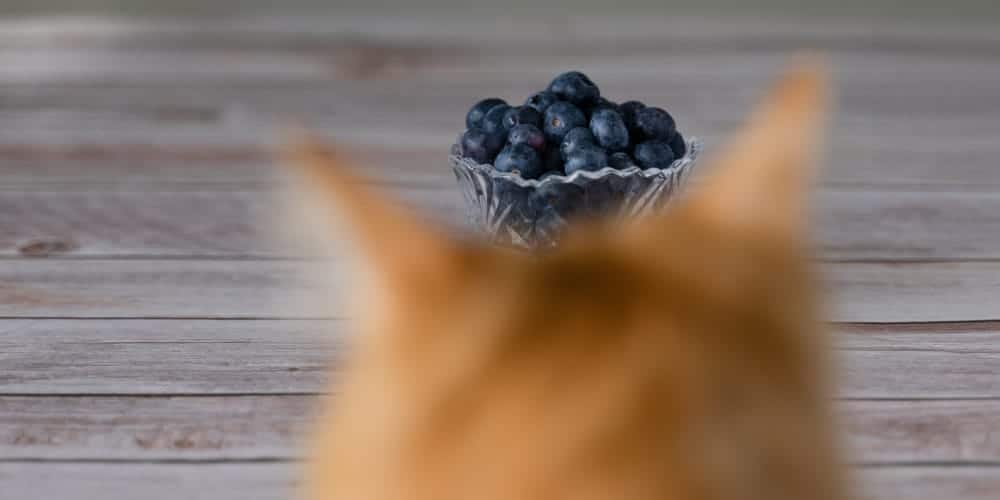Can Cats Eat Blueberries? Here’s Your Answer!

Cats are famous for two things: their curiosity and being picky with food. Some cat owners can spend a hefty amount of time to find food that their cat can oblige to eating, while others have to hold back their cats from munching on the oddest of things. One of which is blackberries.
Blackberries are breakfast bowl favorites for us humans. They’re also among the list of fruits that may spark your feline friend’s curiosity enough to give them a nibble or even scarf down, but are they safe for your cat to eat?
Remember that moderation is key in feeding your cat anything outside of its usual diet, and if you notice any signs of discomfort or disgust on your cat, maybe you should opt for a different snack.
Cat Attitudes is reader-supported. When you buy through links on our site, we may earn an affiliate commission.
Can Cats Eat Blackberries?
In short, yes, blackberries are perfectly safe to chew on. If given in reasonable amounts (and bite-size portions), they may be a beneficial addition to your cat’s diet! These delicious berries are filled with antioxidants, as well as vitamins that provide a significant boost to you and your cat’s health.
But before serving your cat a bowl of blackberries, there are a few things you should know.
Blackberries are a great source of vitamins A, E, C, and K and minerals, calcium, magnesium, and antioxidants. Their benefits include reducing inflammation, improving brain function, and even maintaining great skin. But does it do the same for your cat?
Health Benefits of Blackberries for Cats
Just as blackberries are nutritional for us humans, they’re also a great supplement for our furry friends. The combination of vitamins and minerals, such as potassium and iron, provides a great boost to your cat’s immune system, as well as reducing feline infections and giving your cat’s fur a remarkable shine.
The fibers in these berries can be a great aid in relieving indigestion, constipation, and abdominal pain that your cat may suffer from. However, giving them too much can cause vomiting and diarrhea.
When adding something new to the diet, it’s always better to test your cat’s reaction with small amounts. Then, you can serve more if you’re sure she’s okay with it.
Since cats, just like humans, are prone to obesity and diabetes, you can incorporate blackberries to reduce cholesterol and blood sugar levels. They’re low in both fat and calories, so you don’t need to worry about your cat gaining an extra pound or two from munching on them.
All in all, natural fruits are surely better for your cat’s health than any other synthetic food you’ll give her.
To Feed Or Not To Feed?
Cats are obligate carnivores, which means their diet has to be meat-based. If your cat ingests too many fruits, it may cause vomiting or diarrhea. So, there are a few things to take care of when feeding her blackberries. Here’s a roundup of everything you should consider.
Quantities
If you wish to incorporate blackberries into your cat’s diet, do so in small quantities that serve as treats or a quick snack instead of a whole meal. We don’t recommend feeding your cat more than 2-3 pieces at once to avoid upsetting her stomach.
Any fruits should be treated as a small plus-one to a cat’s diet and not as a regular daily ingredient. Because of their carnivorous nature, any foreign ingredients can cause abdominal pain and indigestion if consumed in large quantities.
Precautions
Blackberries are safe for cats to eat, even wild ones that grow on shrubs that can be found strewn about in the northern hemisphere or ones that you may be growing in your own backyard. The stems, leaves, and even roots are safe for your feline to chomp away.
Besides overeating and indigestion, blackberries pose a threat as a choking hazard for cats. The size of the berry, if ingested whole, can clog your cat’s windpipe and cause her to choke. When serving your cat blackberries, cut them into bite-sized quarters.
Another thing to consider is dirt and pesticides. Before feeding your cat any blackberries, make sure they’re thoroughly washed and clean, and if you just sprayed your backyard-grown shrub, it’s best to keep your furry friend away.
Blackberry Yogurt
This is a tricky question to answer because as nutritional as blackberry yogurt may seem for a cat, with all the calcium packed in both ingredients, this may not be a good idea.
Lactose-intolerance occurs in cats that have been weaned. Although the degree of intolerance varies from one cat to another, lactose can still be a pain for your cat even if ingested in small quantities.
Another issue with yogurt is the added sugar. Cats can’t digest processed sugars due to the lack of amylase enzymes, which help break down carbohydrates as well as sugars.
If you want to serve your cat some blackberry yogurt, we recommend lactose-free and sugar-free yogurts to avoid any inconveniences to your cat’s stomach.
What If Your Cat Hates Blackberries?
That’s perfectly fine! We all know cats have a mind of their own and do as they please. If your cat scrunches its face when presented with a blackberry, just let it be. There are a lot of other fruits you give her.
Other Fruits To Feed Your Cat
Not all cats would fancy a blackberry; if that’s the case, don’t worry, there are other fruity alternatives to serve your cat.
Bananas
Bananas are a great source of potassium and carbs, albeit high in sugar. They should be served in small one-inch chunks and preferably no more than two pieces.
Cantaloupe and Watermelon
Both fruits are a great hydrating snack for your cat on those hot summer days, as well as a great vitamin boost. Best served in one-inch chunks and no more than 1-2 pieces per serving. The seeds should be removed, so your cat doesn’t choke on them.
Mangoes
Another juicy alternative for your cat. Mangoes are a great source of vitamins C and A. Best served peeled and pitted, as both are toxic for cats. 1-2 pieces that are one inch in size are enough.
Apples and Pears
These are on the crunchy side of the snacky spectrum, and they provide your cat with vitamin C as well as fiber. As the fruit pits are toxic for cats, you should wash the fruits, peel them, and remove their core.
Bear in mind that these fruits are high on sugar levels, so one small slice should be enough.
What Not To Feed Your Cat
The most known food not to give to cats is chocolate, but some fruits should be avoided at all costs to keep your kitty safe.
Anything Citrus
This includes lemons, oranges, limes, grapefruit, and anything zesty. You may think that your cat munching on a peel is harmless, but these peels hold oils that are extremely toxic to cats. Make sure to keep your counters clean to avoid any curious nibbling.
Pits and Cores
You may have noticed that we mentioned that apples and pears should have their seeds and cores removed; that’s because they contain cyanide, which is lethal to cats. Other fruits that contain this are cherries, apricots, and peaches.
Figs
These are an absolute no for cats. Even the smallest amount could be lethal to your furry friend. If you plan on having any figs, make sure to keep them away from your cat and dispose of them in a trash can that your cat can’t reach.
Grapes and Raisins
Although their toxicity levels are not as high as the previously mentioned forbidden fruit, there have been recorded kidney failure cases in cats that consumed them. And if eaten in abundance, they may be toxic to cats.
Final Thoughts
Blackberries are a safe treat for your cat, even if off of a wild bush, but only in small quantities. They can be a good supplement to your cat’s daily menu, along with a balanced diet of lean meat.
So, next time you decide to whip yourself up some blackberry pancakes or oatmeal, leave a couple of berries for your furry friend to enjoy too.
